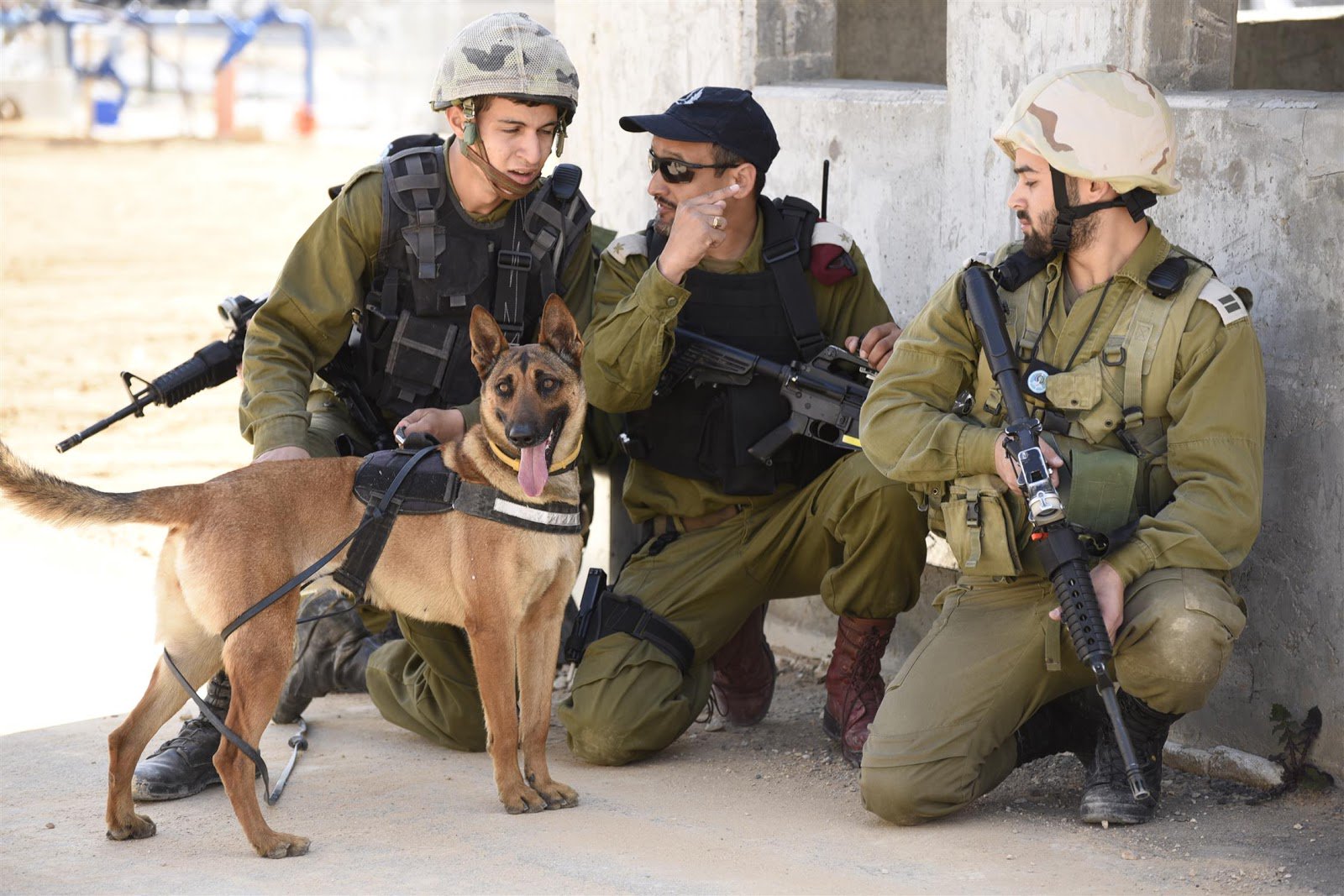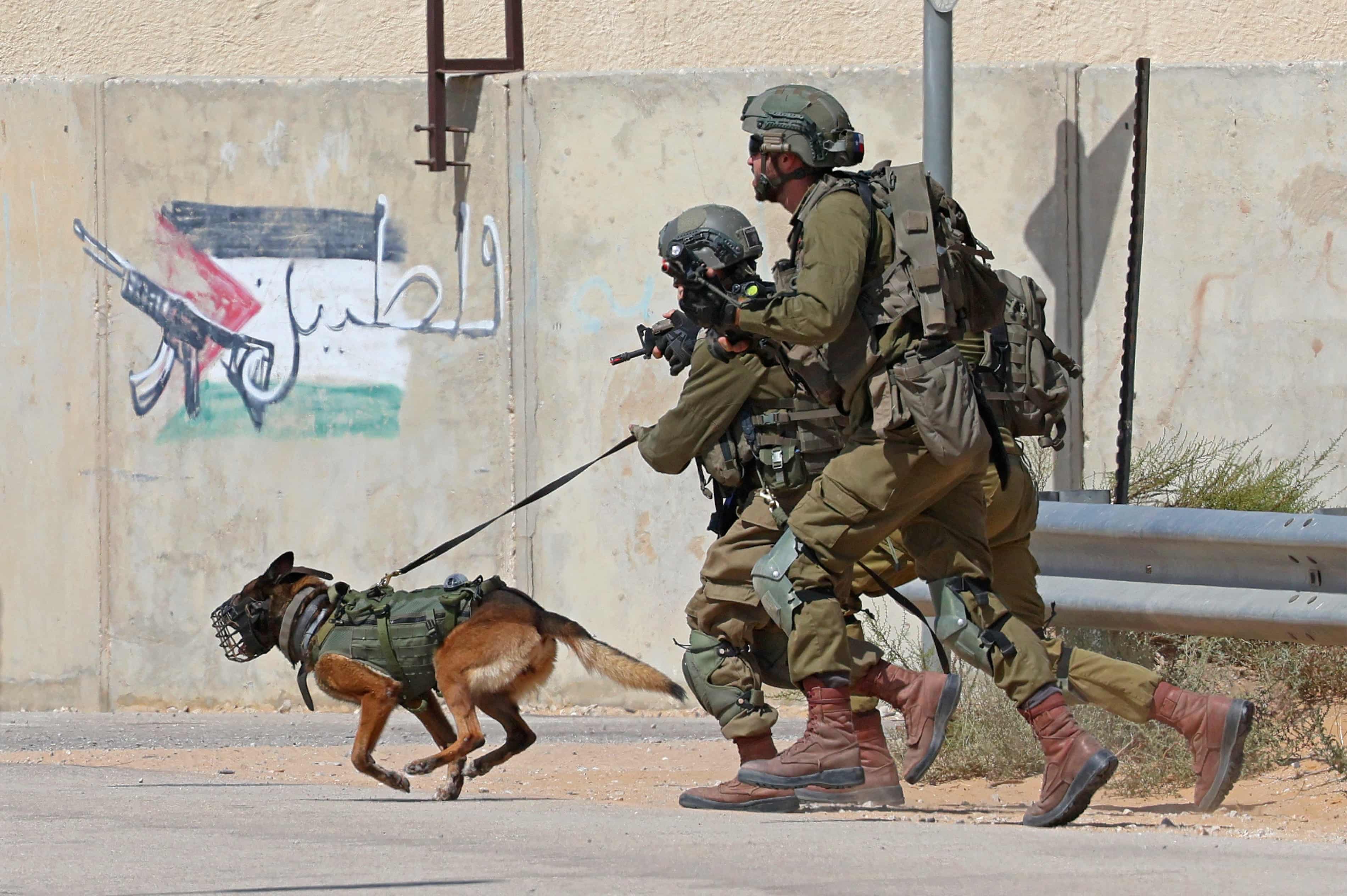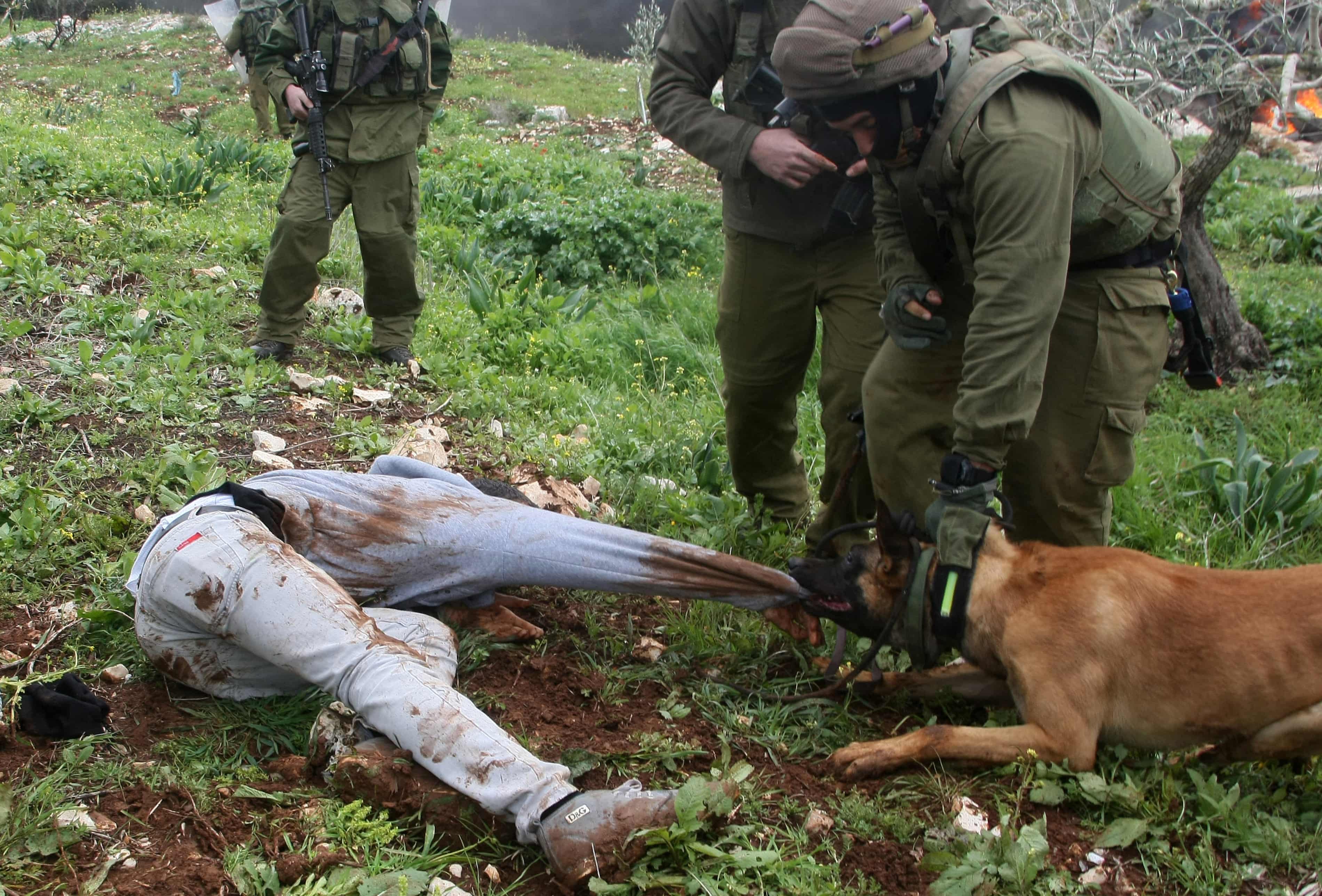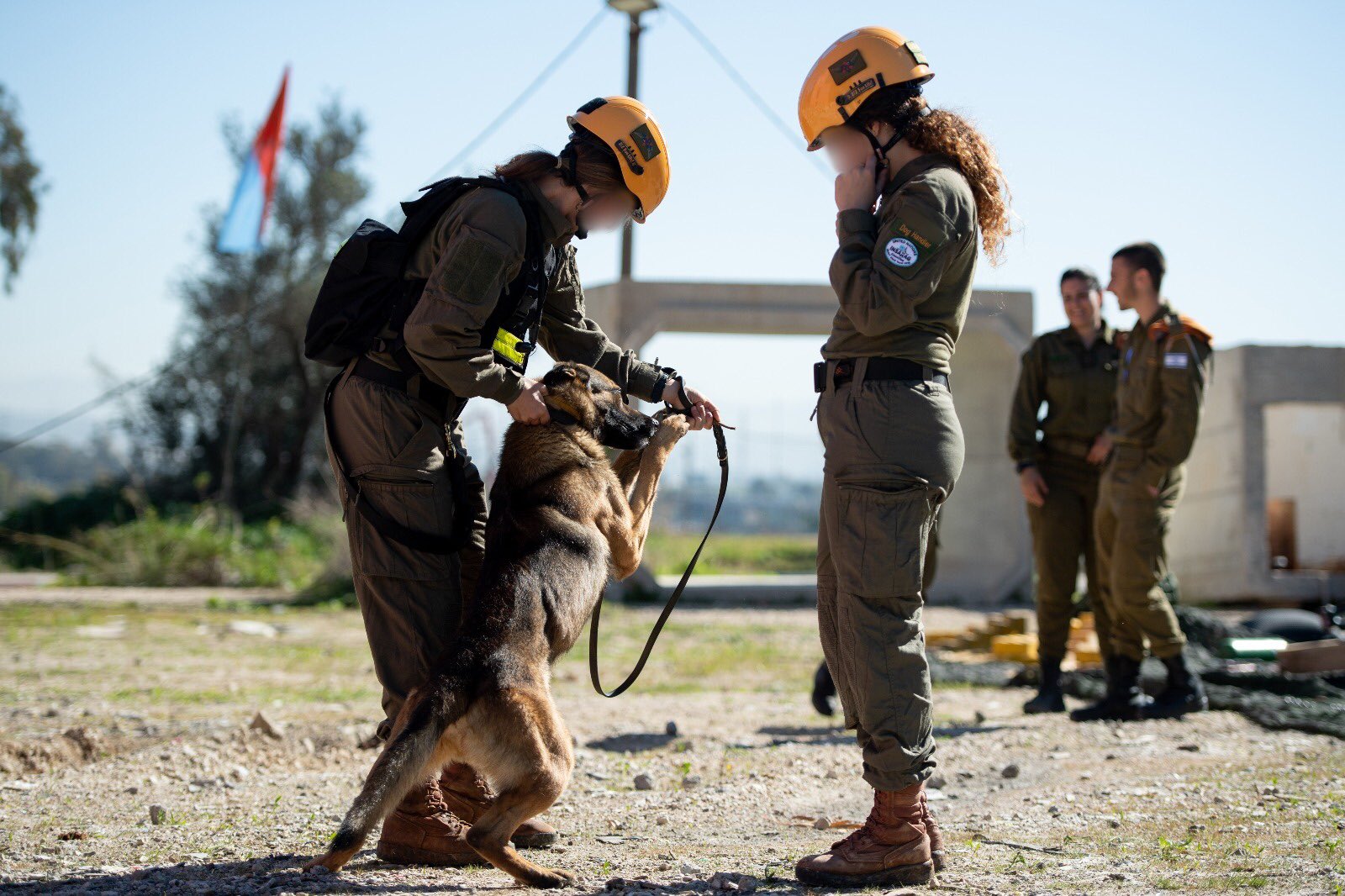How 'Israel' Turned European Dogs Into a Weapon of War Against the Palestinians

“Dutch police dog companies exported at least 110 dogs to Israel between October 2023 and February 2025.”
A recent investigation has revealed the secrets of European companies exporting trained dogs and their decades-long, trusted relationships with the Israeli army, which uses these dogs to suppress and torture Palestinians.
The investigation was based on testimonies collected by Palestinian human rights organizations, such as Al-Haq and Al-Mezan Center for Human Rights, which revealed a systematic pattern of Israeli soldiers using dogs during raids, arrests, and torture of Palestinian detainees.
Since October 2023, the Euro-Mediterranean Human Rights Monitor has documented 146 cases of Israeli military dogs being used against civilians, resulting in severe injuries and, in some cases, deaths.
Amid the escalating use of military and police dogs as tools of repression against Palestinians, fundamental questions are being raised about the role of Western companies in exporting these dogs to “Israel”, and whether this makes them complicit in serious human rights violations.
European Dogs
A recent investigation issued by the Dutch research center SOMO revealed the involvement of Dutch companies in the export of attack dogs to “Israel”, which have been systematically used to torture Palestinians, including children, women, and the elderly, in recent years.
The Israeli army's Oketz military dog unit has used these European dogs to carry out repression and attacks against Palestinian civilians in the occupied West Bank and Gaza Strip.
The investigation reported that Oketz commanders told American urban warfare researcher John Spencer that 99% of the dogs, approximately 70 in number, are imported annually from Europe.
The German website Diensthunde.eu confirmed shipments of Belgian Malinois and German Shepherd dogs to “Israel”, insisting that these dogs were intended only for detection work, not for military offensive use.
According to Israeli reports, the dogs are purchased at a cost of between $10,000 and $15,000 per puppy.
SOMO discovered that police dog companies in the Netherlands obtained the required veterinary certificates for the export of at least 110 dogs to “Israel” between October 2023 and February 2025.
100 of these certificates were granted to the company Four Winds K9. Another 4 certificates were issued to Police Dogs Centre Holland, and 6 were issued to K10 Working Dogs
Under current EU regulations, dogs are not classified as strategic assets or controlled weapons. Therefore, exports do not require special licenses, and countries are not obligated to monitor how these animals are ultimately used.
This regulatory gap has allowed trained dogs in Europe to become, as critics have described them, weapons in conflict zones.
However, the investigation recounted horrific stories, most notably the testimony of a Palestinian mother from Nablus who was getting her children ready for school when soldiers stormed her home and unleashed a police dog on her 3-year-old baby, seriously injuring him and causing psychological trauma for the family.
The investigation also documented the testimony of a Palestinian medic from Gaza, who was arrested by the Israeli army during the war, who said that Israeli soldiers use dogs to terrorize detainees.
In contrast, the Israeli army claimed that the Oketz unit's dogs are not used for punitive purposes or to harm civilians, but only for clear operational needs.

Israeli Violations
Despite protests from civil society organizations and several parliamentarians, the Netherlands has continued to export trained dogs to "Israel".
The Israeli Ministry of War signed a new deal with trusted suppliers from the Netherlands and Germany in January 2024.
It is worth noting that the SOMO investigation is part of a lawsuit filed against the Dutch government by 3 Palestinian and 7 Dutch organizations, accusing it of facilitating “Israel's” crimes against Palestinian civilians by permitting the export of weapons and equipment used in war crimes.
The lawsuit called for a complete ban on the export of police dogs to “Israel”, or at least subjecting them to a new system requiring careful evaluation before each export.
After the lawsuit reached the appeal stage in the Dutch courts, the lawsuit was dismissed, leaving the status quo unchanged.
For her part, journalist Lydia de Leeuw, the lead researcher on SOMO's investigation, criticized what she described as legal laxity.
She explained that police dogs are exported from the Netherlands using the same mechanisms as pets, without any additional oversight, even though they are used as offensive weapons in the field.
She emphasized that the Dutch state bears legal responsibility under the Convention on the Prevention and Punishment of the Crime of Genocide and must take concrete measures to prevent its business entities from complicity in supporting Israeli violations.
As this issue was once again highlighted by the media and human rights organizations, the Dutch parliament later adopted a resolution calling on the government to consider all possible avenues to halt the export of dogs that could be used by the Israeli military in violations against Palestinians.
However, activists pointed to the Dutch government's weak response, emphasizing that political and legal pressure remains the only means of achieving change.
Dutch lawyer Liesbeth Zegveld filed a lawsuit against Four Winds K9 in 2017.
To protect the company from any legal accountability for its role in supporting Israeli crimes, the Israeli government intervened to defend the Dutch company and provided legal support through Dutch law firms.
The Euro-Mediterranean Human Rights Monitor confirmed, in a statement, that the close coordination between Israeli government agencies, Dutch legal entities, and the supplier company exposes a transnational network of deliberate complicity that contributes to the continued empowerment of the Israeli army to commit grave violations against Palestinians.
It noted that the Netherlands continues to export military dogs to the Israeli army and its various security forces, despite their use as a tool for systematic torture and intimidation against Palestinians as part of a systematic policy aimed at spreading terror and fear among the civilian population.

Weapons of War
In the same context, Amnesty International and other human rights organizations have argued that the use of attack dogs on civilians and detainees is a clear violation of international law, calling for urgent regulation of their sale and use as weapons of war.
UN agencies and legal experts, including former UN Special Rapporteur Richard Falk, have warned that European companies supplying trained dogs to the Israeli military are complicit in violations of international human rights law.
It is worth noting that the escalation in the use of dogs by the Israeli military has been linked to some of the most disturbing incidents of violence against Palestinians in recent times.
The most prominent documented case occurred in July 2024, when an Israeli military dog attacked and killed Mohammed Salah Bahar, a young man with Down syndrome, in Gaza.
On May 14, 2024, 70-year-old Dawlat al-Tanani was mauled by an Israeli military dog in her home in Jabalia camp, sustaining a serious injury that she still suffers from today.
In February 2024, a video circulating on social media showed an Israeli military police dog biting the hand of an unarmed Palestinian man during his arrest in Jenin in the occupied West Bank.
Other incidents included a pregnant woman named Tahrir Husni al-Arian, who miscarried after being attacked by a dog in Khan Yunis.
While “Israel” faces charges of genocide at the International Court of Justice, some anti-"Israel" activists are focusing on the issue of pets and other animals being brought into "Israel" as additional evidence to support the notion that Israeli forces in Gaza are morally and ethically unscrupulous.

Secret Unit
In 1939, a secret unit of trained police and military dogs was established under the name ‘Oketz’, meaning ‘bite’ in Hebrew, also known as Unit 7142, as part of the Zionist Haganah.
In 1948, with the establishment of the so-called “State of Israel”, Oketz officially transferred from the Haganah to the Israeli army, but it was only disbanded in 1954 after several failures.
In 1974, following a series of attacks targeting “Israel”, a new unit was established at the Sirkin base, starting with 11 recruits and expanding to include hundreds.
Until 1988, Oketz operated in complete secrecy before becoming a publicly acknowledged part of Israeli army operations.
Oketz relies almost entirely on military dogs imported from Europe, 99% of which are sourced from dog breeding companies in Germany, the Netherlands, Belgium, and the Czech Republic.
Imported dog breeds include Belgian Malinois, German Shepherds and Doberman Pinschers, and British Labradors.
Dogs must be no older than 6 months old when they are recruited to the unit to facilitate intensive training, which can last up to 17 months, preparing them for various tasks, including combat assaults, explosive detection, and tunnel exploration.
Approximately 300 soldiers apply annually to volunteer for the Oketz Unit, and only 25 are selected after passing rigorous tests.
The unit has supporters in the form of non-governmental organizations (NGOs) in countries such as the United States, which raise funds for the unit under the name ‘American Friends of Oketz’.

The Oketz Unit has participated in several operations in Lebanon, Gaza, and the occupied West Bank, during which it lost more than 150 dogs.
According to the Israeli army, the unit lost 3 military dogs during the 2008 assault on the Gaza Strip.
During the 2014 Israeli assault on Gaza, the unit also lost 4 of its trained dogs after buildings they entered were bombed or directly fired upon by resistance fighters.
On January 3, 2025, Israeli army reports revealed that the unit had lost 42 military dogs since the beginning of the war on Gaza, confirming the extensive use of these dogs in combat operations.
Sources
- Unleashing terror: Dutch dogs in Israel’s war crimes
- Attack dogs: how Europe supplies Israel with brutal canine weapons
- Dutch gov’t complicit in Israeli war crimes; export of military dogs must be halted, investigated
- The Dogs of War That Helped the Early Zionist Enterprise Survive
- How Does Israeli Occupation Employ Dogs to Humiliate and Oppress Palestinians?











